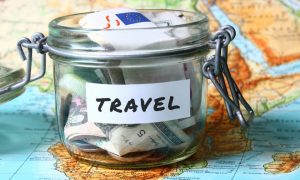Ah, vacations — eventually, we’ll be able to take them again. Over the last year, travel plans have taken a major hit from the COVID-19 pandemic. In a recent survey conducted by IHG Hotels & Resorts, nearly 60% of respondents said they had canceled up to four trips for leisure or business over the last year.
If you’re among the fortunate people whose financial situations have stayed stable through the pandemic, all these canceled vacations might mean some extra unspent cash in the bank.
Andrew Westlin, a financial advisor with the automated investing platform Betterment, said he has noticed a change in sentiment during the pandemic among people seeking financial advice. “We’ve been having conversations around, ‘Hey, I’m starting to luckily get into a position where I have a little bit more cash,’” Westlin said. “Whether it was designated for vacations or just that I’m not going out to eat as much, I have some extra money every month. What should I be doing with that?”
GOBankingRates spoke with Westlin and Michaela McDonald, a personal finance advisor with Albert, and both advise a tiered strategy approach to smartly using those unspent vacation funds. And don’t worry—”smart” doesn’t necessarily mean boring. Read on for their expert advice.
1. Pad Your Emergency Fund
A lot of people have had to tap into their reserves during the pandemic. A recent COVID-19 investor sentiment survey conducted by Betterment suggests that many have also become more focused on their emergency funds. From last March to October, the number of respondents who had an emergency fund grew from 66% to 84%. “This year taught a lot of us that we’re not as invincible as we thought we were, in regards to our jobs and our living situations,” Westlin said.
McDonald recommends having three to four months’ worth of living expenses saved. If you have a family, six to nine months’ worth is a good target. “It sounds kind of boring, but people don’t realize how much weight is lifted off your shoulders when you have an emergency fund built up,” she said. “As basic as it sounds, being able to boost that emergency fund is by far the most financially secure thing you can do.”
2. Pay Off High-Interest Debt
Along with padding your emergency funds, paying off high-interest debt should be on top of your priority list. “If people weren’t able to sustain an emergency fund pre-pandemic, it’s likely they may have a lot of high-interest rate credit card debt or are in that paycheck-to-paycheck mentality,” McDonald said.
According to Westlin, any debt with over a 5% interest rate is considered high and should be paid off as soon as possible. That will help put more money in your pocket for things like vacations in the future.
3. Invest It
If you’ve checked the first two boxes of having solid emergency reserves and a plan for any high-interest debt, and you’ve been canceling trips (and likely saving money) like the people in the IHG survey, the next thing to consider for your vacation funds is to invest them. “Whether that’s in a regular brokerage account, maybe you’re making your first personal investment, and you’re excited about it,” McDonald said. “Or it might just be funneling a bit more into a retirement account for yourself, whether it’s a 401k, or you could open up a Roth IRA or traditional IRA.”
If you have a Roth IRA, Westin said that contributing to it before the end of the tax year is a good strategic decision because of the special tax benefits they include. “I know putting it in your IRA doesn’t seem very exciting, especially if you can’t generally touch that money until you’re 59 and a half, but maybe think of it as funding future you, and what could be grander vacations later on in life,” Westlin said.
4. Education Fund
If you have kids, an education fund is a great place to direct extra money. “I think more parents who are sitting on this cash and who might not be able to go on vacation for maybe another year or two are starting to look at their kids’ education,” McDonald said. “They’re thinking that they should get this invested now.”
A 529 plan allows you to invest for future education costs and has special tax benefits that exempt earnings from federal and most state taxes when you use it for those qualified expenses. Opening one, McDonald said, is easy. Most investment firms offer a sponsored plan and have reasonable fees to open and maintain the account.
5. Pay Your Taxes
With the tax deadline approaching, Westlin suggests considering holding on to your extra money in case you end up owing on your taxes. “Some people I work with are a little bit surprised when they get to tax time and they weren’t preparing for it,” he said.
This year in particular may have brought unexpected changes, perhaps because of a move, working across state lines or a change in employment. If you’ve joined the gig economy or started freelancing, having an extra buffer is especially helpful. “If you weren’t as on top of it throughout the year, you might end up owing taxes,” Westin said. “If you have some money saved up it might ease the shock to your budget.”
6. A Down Payment
Depending on your future goals, a couple thousand dollars can be a good start or continuing contribution toward a down payment on a house, car or other major expense. Many personal finance apps and services offer to target budgeting toward specific goals and will allow you to earmark funds in a targeted way. McDonald suggests that these might be well-placed in a high-yield savings account that will gain a bit more interest on the dollar, but still be available to you when you need them.
7. Home Improvements
The pandemic has put a major focus on the home environment. Putting your extra cash toward home improvements can not only increase your quality of life but potentially increase your home’s value. From freshening up the interior paint or updating fixtures or landscaping, a few thousand dollars can go a long way toward an impactful makeover.
Another smart consideration is upgrading to more energy-efficient appliances or windows, which is a step toward carbon reduction as well as saving money on your energy bill.
8. Self Care
“This year has thrown so many curveballs,” McDonald said. “You really have to look at your personal wellness right now, and if you have a couple extra hundred or thousand dollars, and you’re in a slump—by all means, just find a little bit of joy and don’t be afraid to spend a little bit more on your personal care items.”
Whether it’s a Peloton to get in better shape, a home movie projector or even a backyard sauna, Westlin agrees that a little bit of fun is certainly allowed. “It’s a great time to invest in the things you enjoy. If you’re not going into debt, why not reward yourself?” he said.
9. Future Vacation
Of course, the vacations we haven’t taken can be rolled into vacations in the future. You can simply put the funds you’ve saved in a dedicated bucket so that you don’t have to draw from your regular income when you can travel again. Westlin suggests that you might also keep adding to it by contributing $20 a week or $100 a month. One option is to put the money in an FDIC-insured cash reserve account that earns at a variable interest rate (Betterment offers one such account). “That might help you create a better habit toward saving for vacations down the road,” he said.
McDonald said vacation dreams have also been getting bigger. “As I’ve been working with people, I’ve noticed that their goals for traveling have become more adventurous and more exciting. You didn’t realize how much you’ve wanted to get out and see the world until you can’t.”
10. Donate To a Cause
If you have your other bases covered, putting your extra funds toward a cause you care about can be rewarding in more ways than one. Not only are you helping others, but you can potentially reap the tax benefits of charitable giving as well.
Westlin points out that one creative way to support a cause is by donating investments you have that have appreciated in value. “Not only do you get the deduction, but you don’t owe taxes on those gains. You can use the cash to replenish the shares, so you net the value invested but avoid the tax gains.”
The post 10 Smart Things To Do With Your Canceled Vacation Budget appeared first on GoBankingRates
Original source: GoBankingRates






